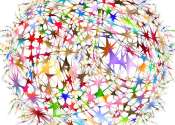Eco-friendly device detects real-time pipe damage
A researcher at University of Limerick has developed a low-cost, environmentally friendly sensor that can detect damage in pipelines and could save water as a result.
May 12, 2021
0
167
Engineering

A researcher at University of Limerick has developed a low-cost, environmentally friendly sensor that can detect damage in pipelines and could save water as a result.
May 12, 2021
0
167
Internet

Research from Carnegie Mellon University may soon help Twitter run faster and more efficiently.
May 11, 2021
0
22
Robotics

Computer scientists at the University of California San Diego have developed a more accurate navigation system that will allow robots to better negotiate busy clinical environments in general and emergency departments more ...
May 10, 2021
0
67
Computer Sciences

The human brain has always been under study for inspiration of computing systems. Although there's a very long way to go until we can achieve a computing system that matches the efficiency of the human brain for cognitive ...
May 5, 2021
0
440
Consumer & Gadgets

Roku is adding a new rechargeable voice remote to its lineup and has begun rolling out a new operating system bring new features to its vast streaming audience.
Apr 13, 2021
0
6
Computer Sciences

Artificial neural networks are known to be highly efficient approximators of continuous functions, which are functions with no sudden changes in values (i.e., discontinuities, holes or jumps in graph representations). While ...
Computer Sciences

Listeners of high-energy music such as hard rock and hip-hop may be given less accurate music recommendations by music recommender systems than listeners of other non-mainstream music, according to research published in the ...
Mar 29, 2021
0
55
Security

The hack of a company that manages ticket-processing and frequent-flier data for major global airlines—including Star Alliance and OneWorld members—has compromised the personal data of an unspecified number of travelers.
Mar 6, 2021
0
5
Business

The U.S. airline industry is pledging to expand the practice of asking passengers on flights to the United States for information that public health officials could use for contact tracing during the pandemic.
Feb 20, 2021
0
8
Engineering

Emerging robotics technology may soon help construction companies and contractors create buildings in less time at higher quality and at lower costs.
Feb 10, 2021
0
3
A computer is a machine that manipulates data according to a set of instructions.
Although mechanical examples of computers have existed through much of recorded human history, the first electronic computers were developed in the mid-20th century (1940–1945). These were the size of a large room, consuming as much power as several hundred modern personal computers (PCs). Modern computers based on integrated circuits are millions to billions of times more capable than the early machines, and occupy a fraction of the space. Simple computers are small enough to fit into a wristwatch, and can be powered by a watch battery. Personal computers in their various forms are icons of the Information Age and are what most people think of as "computers". The embedded computers found in many devices from MP3 players to fighter aircraft and from toys to industrial robots are however the most numerous.
The ability to store and execute lists of instructions called programs makes computers extremely versatile, distinguishing them from calculators. The Church–Turing thesis is a mathematical statement of this versatility: any computer with a certain minimum capability is, in principle, capable of performing the same tasks that any other computer can perform. Therefore computers ranging from a mobile phone to a supercomputer are all able to perform the same computational tasks, given enough time and storage capacity.
This text uses material from Wikipedia, licensed under CC BY-SA